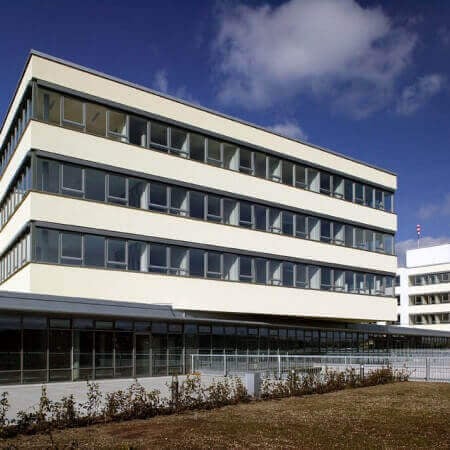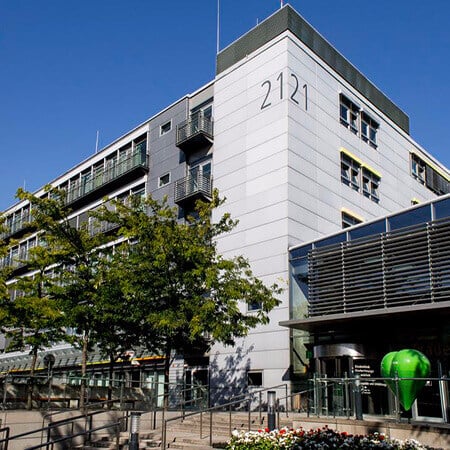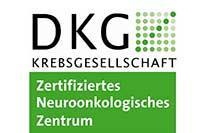The main problem with this disease is that at its initial stages, the astrocytoma is benign. With time, 70% of brain tumors of this type develop into malignant ones.
Content
- What is astrocytoma?
- Types of astrocytoma
- Astrocytoma symptoms
- Diagnostics
- Astrocytoma treatment options
- Prognosis
- Cost of treatment for astrocytoma
- Where can I undergo the treatment of brain astrocytoma?
- How can I undergo brain astrocytoma treatment abroad?
What is astrocytoma?
Astrocytoma is one of the most common types of primary brain tumors.
Astrocytoma is a type of glioma that develops from astrocytes (cells that help neurons to function). Under unfavorable conditions, a massive accumulation of cells occurs, which subsequently forms a tumor.
Astrocytoma affects both males and females, regardless of age and lifestyle. There are no exact reasons that could directly initiate the development of the disease. However, researches show several main factors that provoke it:
- Genetic predisposition. There is an increased likelihood of developing astrocytoma in people with cases of development of pathologies of the brain in the family history.
- Excessive alcohol consumption and smoking.
- Former infectious and viral diseases.
- Dangerous working environment.
Working with chemicals, heavy metals, for example in rubber production, oil production, and processing industries, can increase the risk of astrocytoma development.
If a person is at risk of developing astrocytoma, preventive examinations should be carried out regularly. This will help to reveal the disease at an early stage, while the brain tumor is still benign.
Types of astrocytoma
All types of astrocytomas fall into the group of gliomas – brain tumors localized in the central nervous system.
While they can grow to large sizes, not all the brain tumors have clear contour. Therefore, some of them are difficult to treat.
Astrocytomas are classified according to the three main criteria: tumor type, degree of malignancy, and growth pattern.
The brain tumor belongs to grade 1 of malignancy.
It does not spread to adjacent tissues, grows slowly, but can reach large sizes. Pilocytic astrocytoma responds well to surgical treatments. Children and adolescents are at risk for this type of brain tumor.
A neoplasm of this type belongs to the 2nd degree of malignancy. Low-grade astrocytoma is located in the white matter of the brain and is usually of medium size with precise boundaries. It is amenable to surgical treatments. In difficult cases, treatment of brain astrocytoma is supplemented with radiation therapy or chemotherapy.
It belongs to the 3rd degree of malignancy, as it grows and develops rapidly.
Anaplastic astrocytoma has no clear boundaries, it tends to spread to nearby tissues. The brain tumor is difficult to treat surgically. It is most often diagnosed in patients over 30 years of age.
A brain tumor of the 4th degree of malignancy. It can develop in any part of the brain.
Glioblastoma develops rapidly and is characterized by the spread to the surrounding tissues. It is difficult to treat it with surgery and in most cases it requires radiation therapy or chemotherapy in addition.
By the nature of growth, astrocytomas are divided into:
- Astrocytomas of nodular growth
Such tumors are characterized by clear boundaries and are predominantly benign. They can be located anywhere in the brain and often have multiple cysts. Pilocytic astrocytoma belongs to tumors of nodular growth.
- Astrocytomas of diffuse growth
Brain tumors with diffuse growth have no clear boundaries and can reach gigantic sizes, growing into adjacent tissues. Such neoplasms are highly prone to transformation into malignant ones. Anaplastic astrocytoma and glioblastoma belong to tumors of diffuse growth.
Astrocytoma symptoms
Symptoms of an astrocytoma can be general and local.
Common general symptoms include those caused by tumor development in any part of the brain. They are induced by increased intracranial pressure, as well as by inflammation in the body, influenced by tumor cells. Local symptoms of tumors arise depending on the tumor localization and the destruction of adjacent structures.
General symptoms of astrocytoma include:
- Headaches
- Nausea
- Poor appetite
- Brain fog and vision impairment
- Impaired concentration
- Coordination impairment (vestibular dysfunction)
- Memory impairment
- Constant feeling of fatigue, muscle aches
- In some cases, seizures, specifically epileptic, may occur
Local symptoms of astrocytoma are:
- Clouding of consciousness, local paralysis (caused by the development of a brain tumor in the frontal part of the brain)
- Impairment of the hands' movement (if the brain tumor is located in the parietal part)
- Difficulty speaking (localization of astrocytoma in the temporal part of the brain)
- Dysfunction of the vestibular apparatus, loss of balance (the development of a neoplasm in the cerebellum)
- Impairment and complete loss of vision (a brain tumor is located in the occipital lobe)
Diagnostics
Due to the variety of symptoms that are caused by neurological, mental, and ophthalmological disorders, patients need to undergo a comprehensive clinical examination. During the clinical examination, the neurologist performs a series of procedures and tests that assess reflexes and brain activity. The ophthalmologist determines the degree of vision loss and the cause of the dysfunction of the optic nerve.
Common methods of diagnostics of astrocytoma of the brain are:
- MRI. MRI is an effective method for imaging tumors in all parts of the brain. MRI allows doctors to determine the presence, size, and spreading of the tumor. For a more accurate study, magnetic resonance imaging can be performed with an intravenous injection of a contrast agent.
- CT scan. In the CT scan, the study of the brain parts is carried out in layers, which reveals the detailed features of the neoplasm.
- Angiography. Angiography is an X-ray contrast study that displays the blood vessels near the tumor and the presence of changes in them. It is usually carried out for the correct planning of the operation.
- Biopsy. A biopsy involves harvesting affected tissue for clinical research. A biopsy is conducted for precise diagnosis with endoscopy or surgical intervention.
Carrying out a full and comprehensive clinical examination of the patient's body plays a major role in the accurate description of the degree of damage, which further contributes to planning an effective treatment of brain astrocytoma.
Astrocytoma treatment options
Astrocytoma treatment protocol depends on the location of the tumor, its size, and the grade of malignancy. Depending on the diagnostic results, the doctor may prescribe chemotherapy, radiation therapy, or surgery. In some cases, the combination of the above is used.
Surgery is effective at the early stages of the disease until the cancer cells have spread beyond the primary area. Astrocytomas of diffuse growth do not have clear boundaries, and therefore are difficult to treat surgically.
In the field of modern neurosurgery, there are innovative techniques that allow doctors to remove a tumor with high precision without damaging healthy tissues. Before the surgery, the patient receives injection of the special contrast agent, which accumulates in the area of the neoplasm. It has fluorescent properties, and when exposed to a particular light, stains the tumor, and makes it visible.
All surgical procedures are carried out under the additional control of 3D visual equipment, which guarantees the precision of the doctor’s actions.
The surgery is performed under general anesthesia, but if the tumor is located close to functional centers, the patient is left awake in order to keep those centers functioning during the surgery. The tumor can be removed with an endoscope through small holes in the skull. Such an intervention is considered minimally invasive, and the procedure itself takes 2-4 hours. Open astrocytoma surgery, which involves a craniotomy, takes up to 6 hours.
Chemotherapy involves drug treatment that negatively affects the growth and spread of cancer cells. Chemotherapy can be prescribed alone or as part of a comprehensive astrocytoma treatment, with surgery or radiation therapy. Chemotherapy is conducted intravenously or like a course of oral drug treatments.
Radiation therapy is a modern non-invasive method of tumor destruction. Radiation therapy destroys a tumor with a beam of ionizing radiation.
The advantage of modern radiation therapy is gradual effect on the malignant formation with minimal affection of healthy tissues. The required dose of radiation to destroy the tumor is delivered during a certain number of sessions. There are no tumor features that contradict carrying out radiation therapy. It is prescribed as an independent method of treatment or in combination with surgical intervention or chemotherapy.
Certain types of radiation therapy can be highly effective while preventing the damage of nearby healthy tissues. For astrocytoma treatment, intensity-modulated radiation therapy and proton beam radiation therapy are commonly used.
Proton beam radiation therapy is a type of radiation therapy that has a low impact on healthy tissues close to the tumor in comparison to conventional irradiation. A decrease in the volume of irradiated healthy tissue can lead to a significant reduction in long-term toxicity, which can lead to better quality of life.
The principle of intensity-modulated radiation therapy involves the remote delivery of high doses of radiation directly to the tumor while healthy tissues nearby are minimally exposed to radiation. The accuracy of radiation therapy is achieved by the specified computer system planning.
Prognosis
The prognosis for astrocytoma of the brain is ambiguous because a growing tumor can have irreversible consequences for the patients. The pathology is prone to relapse, especially during the first few years after treatment. A promising prognosis depends on the timely diagnosis and effective treatment of brain astrocytoma.
Cost of treatment for astrocytoma
The prices in hospitals listed on the Booking Health website are relatively low. As a rule, you can save up to 30-40% of the usual treatment price by booking the medical program here.
With Booking Health, you can book the brain astrocytoma treatment at an affordable price. The cost of treatment varies in different countries. The price of treatment of brain astrocytoma goes as follows:
- Cost of diagnostics varies from 478 EUR to 2,351 EUR
- Cost of treatment with radiation therapy varies from 13,800 EUR to 29,518 EUR
- Cost of surgical complete or partial resection of astrocytoma varies from 7,728 EUR to 31,975 EUR
Where can I undergo the treatment of brain astrocytoma?
Among foreign hospitals, the best success rates in the treatment of brain astrocytoma are demonstrated by:
- University Hospital Rechts der Isar Munich, Germany
- Charite University Hospital Berlin, Germany
- University Hospital HM Monteprincipe Madrid, Spain
- University Hospital for Neurosurgery Salzburg, Austria
- University Hospital Freiburg, Germany
How can I undergo brain astrocytoma treatment abroad?
Arranging the treatment of brain astrocytoma abroad by oneself can be challenging. It requires specific knowledge and experience in medical tourism. It is safer, easier, and less stressful to shift some responsibility onto a medical tourism agency that will support you throughout your journey.
Booking Health is the largest and most transparent medical tourism agency in the world. Treatment abroad is arranged due to the direct cooperation with leading foreign hospitals.
If you want to get more information on the suitable treatment type for you or the cost of treatment, please leave a request on the Booking Health website. We will contact you and answer all your questions.
Authors:
The article was edited by medical experts, board certified doctors Dr. Nadezhda Ivanisova and Dr. Bohdan Mykhalniuk. For the treatment of the conditions referred to in the article, you must consult a doctor; the information in the article is not intended for self-medication!
Our editorial policy, which details our commitment to accuracy and transparency, is available here. Click this link to review our policies.




















